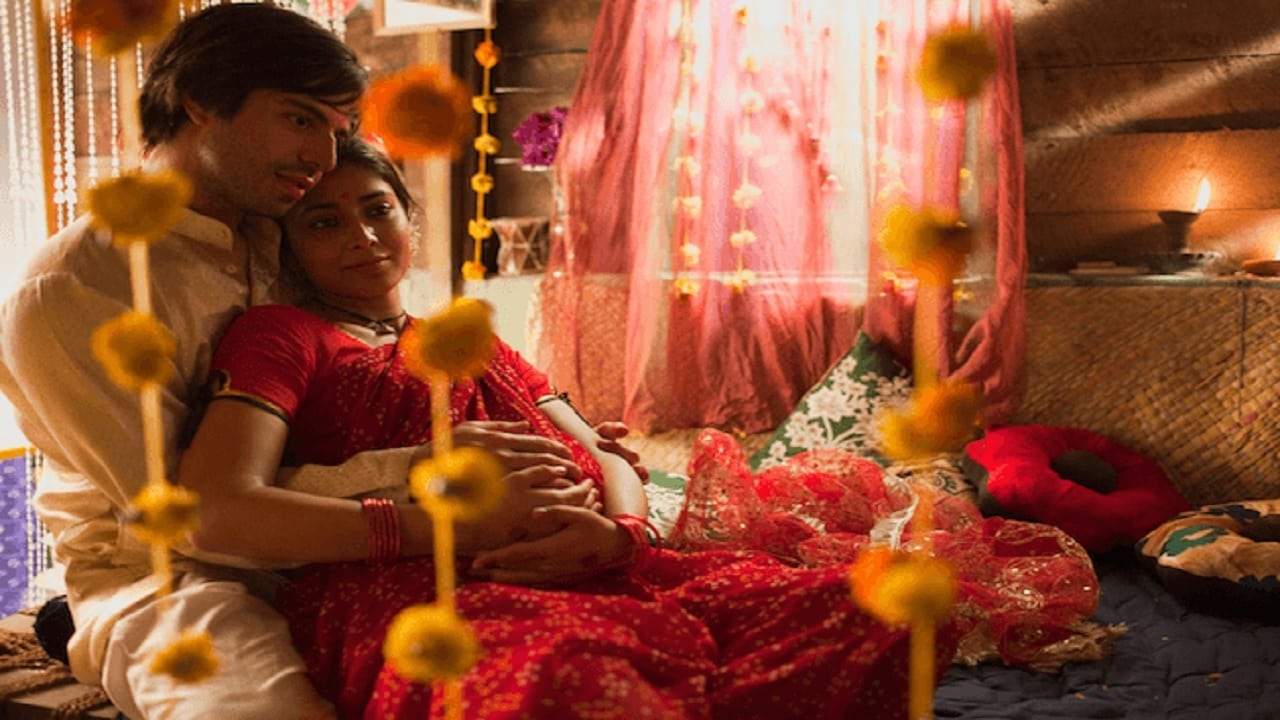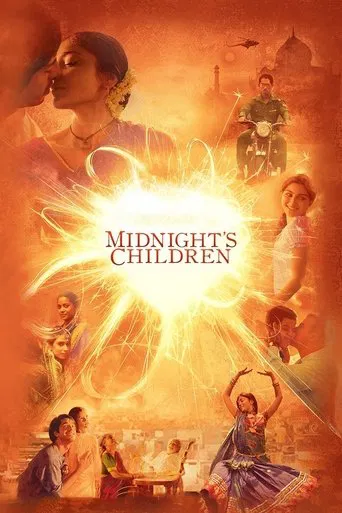

An adaptation of Salman Rushdie's 1981 novel of the same name, 'Midnight's Children' is a passable film. Go in with limited expectations & your chances of being disappointed will be less. 'Midnight's Children' Synopsis: A pair of children, born within moments of India gaining independence from Britain, grow up in the country that is nothing like their parent's generation.'Midnight's Children' is an engaging story on paper, but on celluloid, it appears clichéd. India-Pakistan conflict, is beaten to death in cinema. Sure, the novel must've been captivating, but on-screen, it looks very regular. Deepa Mehta's Direction is terrific. She makes this otherwise passable film, watchable, due to her true talent as a storyteller. Performance-Wise: Satya Bhabha delivers a sincere performance. Shriya Saran has 2 standard expressions. Siddharth tries hard to look like a menace. Darsheel Safary is very good. Seema Biswas & Ronit Roy are excellent, as ever. Others lend support.On the whole, 'Midnight's Children' is watchable, at best.
... View MoreMidnight's Children is a story about India after independence, and how the hopes for that country materialized for the first generation after 1947. But primarily this is a film about India. It is a sprawling, complex, epic movie with several themes, including Indian history, Indian politics, fate, destiny, the relationship between men and women, and social justice. The film tells us the life story of Saleem Sinai and his family.As someone who has not been to India, and has (so far) developed little interest in it, I enjoyed the rich depiction of this exotic and beautiful world. I enjoyed learning more about India and its history. The filmmaker's and writer's love for that country shines through the celluloid.The first half of the movie, the family drama involving the Sinai family, is the strongest. We follow the events that occur to this family, including the shocking act of two babies being switched at birth. We find out that our protagonist is not really from this family at all. The character development in this part of the movie is excellent. Some scenes from this part will remain with me a long time.About halfway through, the movie changes direction completely. I had to be dragged along after this because I was truly enjoying the family story and didn't want it to end. I feel it might have been more satisfying to film this as two or three movies, rather than trying to cram it all into one.Strange, supernatural and symbolic elements are added to the mix. (At this point I'd like to point out that I have not read the book, or any Rushdie novel. I understand this is a feature of his work.)I have to admit that this aspect did not work that well for me. I suppose it's because this film is mostly realistic, and I thought it was unnecessary. At times I was quite moved; however, at other times I felt the pathos was laid on a little too thick. Also, some of the plot, and a few of the scenes, felt unrealistic to me, especially the portrayal of the military and war. Perhaps this was meant to be one of the stylized aspects of the movie. Saleem's immediate relationship with Parvati and his ready acceptance of the child also felt wrong to me.I thought the acting in this movie was fine, even from the child actors. There are a few truly beautiful women in this movie. It's as if the allure (and suffering) of Indian women was one of the themes. However, Shiva's character felt like a caricature to me. Satya Bhabha was required to play a most difficult and at times far-fetched role, and essentially had to carry the difficult, more unrealistic half of the movie himself. I think it would have been difficult for anyone to pull it off. They didn't really do a good job transforming him physically so that he actually looked like the victim of an abusive family situation, a coma patient, an amnesiac, a soldier and a war victim. He did not really convey these things well.I'm so glad they brought Mary back at the end. It would have been unbearable not to know what had become of her.This movie depicted Indira Gandhi and Muslims in a way that was new to me. That's all I want to say about that. Religion is always in the background, but it does not play much of a role in this movie at all.This is a movie that makes you think "Let the rich be poor, and the poor rich". (No, this doesn't work out at all.) "You can be whatever you want to be." (As we are shown, also not true.) "India after independence did not turn out the way we wanted, but at least we survived." (But many did not.)I would recommend this beautiful and passionate movie particularly to anyone who is interested in India and Salman Rushdie's work, and is willing to cope with the length, unevenness and stylized elements. It's worth about 8 in my view, but I'm rounding it down because of these factors.
... View MoreI watched Midnight's Children today. Salman Rushdie's book is one of my all-time favorites and I went into the theater with unabashed excitement and even a bias in the favor of the movie I was yet to watch. Most people will find the movie interesting; I doubt that many would label it 'great'. Even when you make the allowance that it is hard to recapture the magic of a great book on celluloid, it is easy to see that the task Deepa Mehta set herself was near-impossible to achieve. Salman Rushdie's book is a sprawling tale of magic-realism that weaves many incidents together on a large canvas. The attempt to replicate it in a two-hour plus film necessitates a jerky journey that hurries from one incident to the other, just managing to retain seamless coherence. In some ways the movie is like life itself – you know that there would be an ending though not every peak and trough clearly point in that direction.There is also the problem of depicting magic-realism on this medium. The story is so inextricably intertwined with India's post-Independence history that one begins to seek fidelity in every detail. And not only does the film give accuracy a short shrift; the surrender by Pakistani troops comes across as a minor function at a school with the Indian General dressed indifferently, Major Shiva is not only a war hero (and one who appears during the surrender ceremony and in the presence of his Generals with his cap carelessly shoved under the shoulder flap) but is also in-charge of demolitions of slums and hovering around the country's Prime Minister. The movie's many switches to 'magic' are somewhat less than credible. To be fair to them, this is a 'flaw' that the makers perhaps could not have escaped – it is one thing to see magic in, say, Harry Potter where all else is magic too and thus very much 'acceptable' to the subconscious and quite another to be confronted with bits of sudden magic when one has recently settled down to realism. I must point out that I had not felt this disconnect when I had read the book, some three decades ago. In the movie there are two completely contrasting tastes competing for the viewer's palate with the obvious outcome. Before I go any further, I recommend the movie both to those who have read the classic and those who have not. The experience for the two groups will be absolutely disparate, I suspect!Most of the performances are good and Seema Biswas as the guilt-ridden nurse who starts it all by switching babies is noteworthy. But both the redoubtable Anupam Kher as the father and Rahul Bose as a Pakistani General are forgettable caricatures. The point about the destinies of India and Pakistan being inseparable comes at you, loud and clear. And in his voice-over Salman Rushdie underscores the point in the end that our Republic has not kept all the promises that were made at the stroke of freedom. Perhaps, when we are seized by joy and optimism, such becomes the nature of promises we humans often make to ourselves.
... View MoreMidnight's Children, that mammoth book written by Salman Rushdie which all English Literature Undergraduates are forced to read and marvel at, finally gets a long-awaited film adaptation. Having read the book many years ago, I never imagined anybody would be bold enough to actually film the text, with all it's magical realism and grand sweeps through the course of history, so let's see how this goes...Telling the story of Saleem, born on the stroke of Midnight on August 15th 1947 i.e when India finally became an independent nation, whose life is altered from the minute he is born, as he is given to the wrong parents, rich parents, and thus afforded a life of luxury that he was not destined to have. On top of that, he has magical powers (that aren't that great to be honest), and finds that every child born at Midnight on August 15th also has magic powers, it's like the Power Rangers: India. What thus follows is a story narrated by Rushdie himself, as Saleem's life links and progresses with the historical and political turmoil taking part in India throughout the century, ( Partitions, Civil Wars, States of Emergency), and Saleem, much like India at the time, struggles and battles to find out his own identity.The film does well in scaling down the content of the novel, it's more of a drama with bits of comedy, than a grand epic or fantasy, and parts do feel rushed as the viewer is transported from year to year without any sense of anything really linking together, despite the valiant attempts of Rushdie narrating the whole story. However, it is still a film that does manage to vividly depict a fascinating period in history with lots of very visual scenes that leave a lasting impression, and more importantly, it links it all together with individual plights, to add that emotional intensity. So overall I'd still recommend it.7/10
... View More